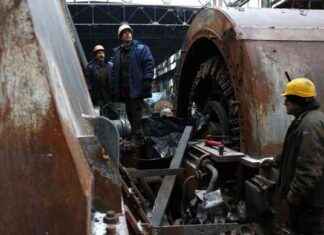Back to good old habits. This Friday, September 2, an exceptional energy defense council will be convened by the President of the Republic. It takes place in a context of inflation of energy prices caused by the war in Ukraine, which should be accentuated with the decision of Gazprom to suspend, for three days, the routing of its gas to Europe. On Tuesday, Élisabeth Borne, the Prime Minister, promised that there would be no power cuts in French homes while encouraging companies the day before to draw up their own electricity rationing plans. Among the solutions studied, large retailers have chosen to turn off their illuminated signs at night, and plan to reduce opening hours in the event of a deterioration in the situation.
Despite the promise of the head of government, the prospect of a blackout is not completely excluded. The challenge of Friday’s meeting is to put solutions on the table to prevent prices from skyrocketing. “The National Defense and Security Council (SDSN) will aim to take stock of the situation as well as the scenarios envisaged to prepare for all scenarios this fall and winter,” explains an adviser from the Élysée with AFP.
In the texts, to set up an exceptional defense council, it should be justified by the existence of a threat to the vital interests of the country and of the French people. Emmanuel Macron judged, here, with the horizon of a harsh and uncertain winter, that the conditions were met to hold this meeting, which he chairs. This defense council has the particularity of being protected by defense secrecy: the executive is therefore not required to draw up a report to the press, as must be the case at the end of the council of ministers. .
Until 2009, the prerogatives of the council were reserved for military matters, before a decree, published in December of this year, broadened its powers, by including the notion of internal security. The CDSN, as it is called in the corridors of the Elysée, must be composed of the Prime Minister, the Ministers of Economy, Budget, and Foreign Affairs, as well as the ministers concerned by the subjects provided for in the ‘agenda. Expert participants, bound by defense secrecy, may also be invited. Its role is to establish solutions – without going through Parliament – on urgent issues. It has the advantage of being agile in the eyes of the executive.
Its use, before the appearance of the wave of attacks in France, was moderate. It was used ten times in 2015; 32 in 2016; 42 times in 2017. Emmanuel Macron uses it on a recurring basis, appreciating the confidentiality of the meeting which was held for a time in the bunker of the presidential palace, 70 meters underground, and now takes place in the Murât lounge, where usually takes place the council of ministers.
But the silence that surrounds these decisions feeds the incomprehension and anger of the opposition. “Emmanuel Macron once again chooses to bypass parliament,” said Marine Le Pen, president of the RN group in the National Assembly. “Long live democracy with Macron sauce”, adds Mathilde Panot, rebellious leader in the National Assembly.
The senator of the LR group, Jérôme Bascher, also disputed the recurrence of his job: “Emmanuel Macron did not understand that it is in Parliament that this must happen, there is no longer any urgency even if there are crises.” What the spokesman of the government, Olivier Véran, replied on Franceinfo: “There are subjects of the order of national security and of high strategic value”. Given the current situation, that of electricity is now.








